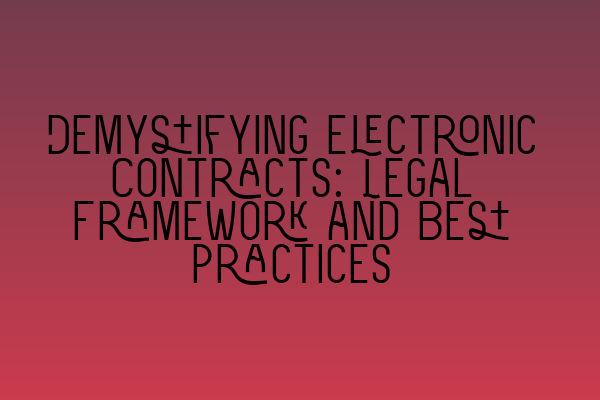Demystifying Electronic Contracts: Legal Framework and Best Practices
Electronic contracts have become an essential part of business transactions in today’s digital world. With the advancement of technology, it is crucial for solicitors and legal professionals to understand the legal framework and best practices surrounding electronic contracts. In this post, we will demystify electronic contracts, providing you with valuable insights and guidance.
The Legal Framework of Electronic Contracts
Electronic contracts are legally binding agreements formed electronically, without the need for paper documents or physical signatures. The legal framework surrounding electronic contracts is primarily governed by the Electronic Communications Act 2000 and the EU Electronic Identification and Trust Services Regulation (eIDAS).
The Electronic Communications Act 2000 provides a legal basis for electronic signatures and ensures that electronic contracts have the same legal effect as traditional paper-based contracts. It recognizes the validity and enforceability of electronic contracts as long as certain requirements are met.
Under the eIDAS Regulation, electronic signatures are categorized into three types: standard electronic signatures, advanced electronic signatures, and qualified electronic signatures. Standard electronic signatures are the most commonly used and are generally deemed legally valid, as long as they can be attributed to the signer. On the other hand, advanced and qualified electronic signatures offer a higher level of legal certainty and are subject to stricter requirements.
It’s important to note that while electronic contracts are generally enforceable, there are exceptions. Certain types of contracts, such as wills, powers of attorney, and contracts for the sale or disposition of land, may require specific formalities and cannot be formed electronically.
Best Practices for Electronic Contracts
When it comes to electronic contracts, there are several best practices that solicitors should follow to ensure their validity and enforceability. Here are some key considerations:
1. Consent and Intention to be Bound
In order for an electronic contract to be valid, all parties involved must have the requisite intention to be bound by the terms of the contract. This can be demonstrated through clear and unambiguous communication of acceptance and consent to the contract’s terms.
2. Clear and Concise Contract Terms
It is crucial for solicitors to draft electronic contracts with clear and concise terms. The use of plain language and avoiding overly complex legal jargon can help avoid any confusion or misunderstandings. Clearly define the rights, obligations, and remedies of each party involved.
3. Authentication and Verification
Ensuring the authenticity and integrity of electronic contracts is vital. Using secure electronic signature methods, such as advanced electronic signatures or qualified electronic signatures, provides an additional level of authentication and verification. This helps protect against fraud and unauthorized modifications to the contract.
4. Retention and Accessibility
Electronic contracts should be stored and retained in a manner that allows for easy access and retrieval. This includes maintaining a proper record of the contract, including any amendments or revisions, to ensure transparency and accountability.
5. Compliance with Data Protection Laws
When dealing with electronic contracts, solicitors must comply with relevant data protection laws, such as the General Data Protection Regulation (GDPR) in the UK. This includes ensuring the secure handling and storage of personal data contained within the electronic contract.
Conclusion
Electronic contracts have revolutionized the way business transactions are conducted. Understanding the legal framework and best practices surrounding electronic contracts is crucial for solicitors to ensure their validity and enforceability. By following the key considerations and best practices outlined in this article, solicitors can confidently navigate the world of electronic contracts, providing their clients with efficient and legally sound solutions.
For further insights into legal practice and decision-making, check out our related article: Unveiling Real-Life Case Studies: Insights into Legal Practice and Decision-Making.
If you’re interested in exploring solicitor salaries in the UK, don’t miss our article: Exploring Solicitor Salaries in the UK: Average Earnings and Factors Affecting Income.
For tips on mastering client relationship management skills, head over to: Mastering Client Relationship Management: Skills for Solicitors to Enhance Trust and Loyalty.
If you are considering pursuing a law school education in the UK, our article on Pursuing a Law School Education in the UK: Choosing the Right Path for Your Future will provide valuable guidance.
And if you’re looking for a roadmap to becoming a solicitor and securing training contracts, be sure to read our article: Securing Training Contracts: A Roadmap to Becoming a Solicitor.
